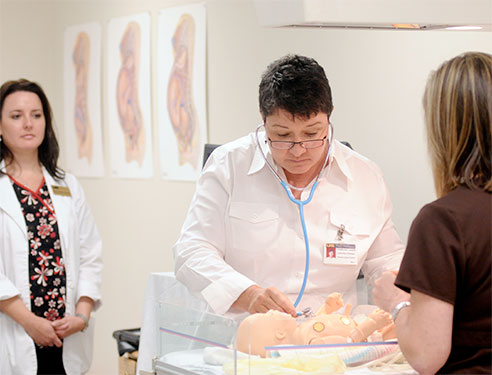 The University of Alabama at Birmingham School of Nursing is one of only 25 schools of nursing nationwide to receive a grant to increase the number of nurses holding Ph.D.s. The Robert Wood Johnson Foundation’s Future of Nursing Scholars program will provide financial support, mentoring and leadership development to nurses who commit to earning their Ph.D.s in three years. UAB will select one or two nursing students to receive this prestigious scholarship.
The University of Alabama at Birmingham School of Nursing is one of only 25 schools of nursing nationwide to receive a grant to increase the number of nurses holding Ph.D.s. The Robert Wood Johnson Foundation’s Future of Nursing Scholars program will provide financial support, mentoring and leadership development to nurses who commit to earning their Ph.D.s in three years. UAB will select one or two nursing students to receive this prestigious scholarship.
The Future of Nursing Scholars program is a multifunder initiative, with foundation dollars leveraged for support, as well as funding from the school. In addition to RWJF funds, UAB is using endowed funds specifically set aside for doctoral nursing education. Doctoral students chosen to receive this award will begin the Future of Nursing Scholars program this summer and their Ph.D. studies this fall.
“This is a tremendous opportunity for our students in their pursuit to shape patient-centered health care by excelling as clinical researchers and faculty,” said Karen Meneses, Ph.D., professor and associate dean for Research in the School of Nursing. “Nurses are the front line for care, and with more than 3 million members, the nursing profession is the largest segment of the nation’s health care workforce. Because of this, we need to continue to achieve higher levels of education and training and be full partners with physicians and other health care professionals in redesigning health care.”
| In its landmark nursing report, the Institute of Medicine recommended that the country double the number of nurses with doctorates; doing so will support more nurse leaders, promote nurse-led science and discovery, and put more educators in place to prepare the next generation of nurses. The Future of Nursing Scholars program is intended to help address that recommendation. |
In its landmark nursing report, the Institute of Medicine recommended that the country double the number of nurses with doctorates; doing so will support more nurse leaders, promote nurse-led science and discovery, and put more educators in place to prepare the next generation of nurses. The Future of Nursing Scholars program is intended to help address that recommendation.
“At RWJF, we are working to build a Culture of Health that enables everyone in the United States to live the healthiest lives possible,” said Susan Hassmiller, Ph.D., co-director of the program and RWJF’s senior adviser for nursing. “This program will create the transformative nurse leaders who can make that vision a reality by driving crucial changes in health care and inspiring future generations of nurses to achieve even more.”
Less than 1 percent of the nation’s more than 3 million nurses have Ph.D.s in nursing or a related field. In addition, the average age at which nurses get their Ph.D.s in the United States is 46 — 13 years older than Ph.D. earners in other fields. This program will provide an incentive for nurses to start Ph.D. programs earlier so they can have long leadership careers after earning their Ph.D.s.
“The Future of Nursing Scholars represents some of the best and brightest minds in nursing today,” said Julie Fairman, Ph.D., Future of Nursing Scholars program co-director. “Each of them has committed to complete their Ph.D. education in only three years. To support their studies, we provide each scholar with a $75,000 scholarship and the leadership, research and other skills they need to take their nursing careers to the highest levels. They will be at the leading edge of health care research and nursing education.”
Fairman is also the Nightingale Professor of Nursing, the chair of the Department of Biobehavioral Health Sciences and director of the Barbara Bates Center for the Study of the History of Nursing at the University of Pennsylvania School of Nursing.